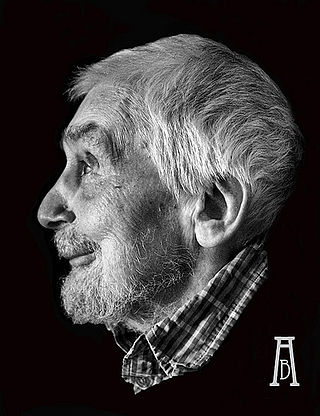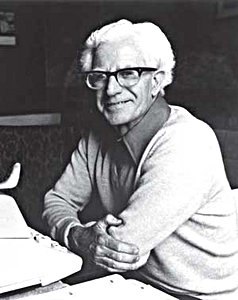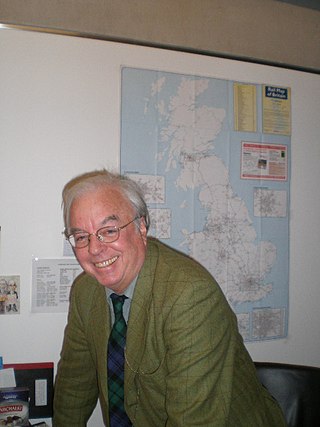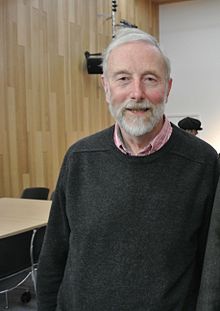
Edwin Muir CBE was a Scottish poet, novelist and translator. Born on a farm in Deerness, a parish of Orkney, Scotland, he is remembered for his deeply felt and vivid poetry written in plain language and with few stylistic preoccupations.

Edwin George Morgan was a Scottish poet and translator associated with the Scottish Renaissance. He is widely recognised as one of the foremost Scottish poets of the 20th century. In 1999, Morgan was made the first Glasgow Poet Laureate. In 2004, he was named as the first Makar or National Poet for Scotland.

Neil Miller Gunn was a prolific novelist, critic, and dramatist who emerged as one of the leading lights of the Scottish Renaissance of the 1920s and 1930s. With over twenty novels to his credit, Gunn was arguably the most influential Scottish fiction writer of the first half of the 20th century.

Lewis Grassic Gibbon was the pseudonym of James Leslie Mitchell, a Scottish writer. He was best known for A Scots Quair, a trilogy set in the north-east of Scotland in the early 20th century, of which all three parts have been serialised on BBC television.
Stephen Maxwell was a Scottish nationalist politician and intellectual and, from the 1980s, a leading figure in the Scottish voluntary sector.
Francis George Scott was a Scottish composer often associated with the Scottish Renaissance.

The Kailyard school is a proposed literary movement of Scottish fiction; kailyard works were published and were most popular roughly from 1880–1914. The term originated from literary critics who mostly disparaged the works said to be within the school; it was not a term of self-identification used by authors alleged to be within it. According to these critics, kailyard literature depicted an idealised version of rural Scottish life, and was typically unchallenging and sentimental.

John Robin Jenkins was a Scottish writer of 30 published novels, the most celebrated being The Cone Gatherers. He also published two collections of short stories.

William Alexander Murray Grigor is a Scottish film-maker, writer, artist, exhibition curator and amateur architect who has served as director of the Edinburgh International Film Festival. He has made over 50 films with a focus on arts and architecture.
Professor Duncan Munro Glen was a Scottish poet, literary editor and Emeritus Professor of Visual Communication at Nottingham Trent University. He became known with his first full-length book, Hugh MacDiarmid and the Scottish Renaissance. His many verse collections included from Kythings and other poems (1969), In Appearances (1971), Realities Poems (1980), Selected Poems 1965–1990 (1991), Selected New Poems 1987–1996 (1998) and Collected Poems 1965–2005 (2006). His Autobiography of a Poet appeared with Ramsay Head Press in 1986. He edited Akros magazine for 51 numbers from August 1965 to October 1983. His work to promote Scottish poets and artists included Hugh MacDiarmid and Ian Hamilton Finlay, among others. Some of his poetry was translated into Italian.
Ian Macpherson (1905–1944) was a Scottish writer from Leslie Place, Forres, Moray, Scotland. He graduated from Aberdeen University in 1928 with a first-class honours degree in English. His first novel, Shepherds Calendar, was published in 1931.The book depicts a young man's growth to maturity in a farming community dominated by hard toil and the influence of the seasons.

Cencrastus was a magazine devoted to Scottish and international literature, arts and affairs, founded after the Referendum of 1979 by students, mainly of Scottish literature at Edinburgh University, and with support from Cairns Craig, then a lecturer in the English Department, with the express intention of perpetuating the devolution debate. It was published three times a year. Its founders were Christine Bold, John Burns, Bill Findlay, Sheila G. Hearn, Glen Murray and Raymond J. Ross. Editors included Glen Murray (1981–1982), Sheila G. Hearn (1982–1984), Geoff Parker (1984–1986) and Cairns Craig (1987). Raymond Ross was publisher and editor of the magazine for nearly 20 years (1987–2006). Latterly the magazine was published with the help of a grant from the Scottish Arts Council. It ceased publication in 2006.

Professor Christopher Harvie is a Scottish historian and a Scottish National Party (SNP) politician. He was a Member of the Scottish Parliament (MSP) for Mid Scotland and Fife from 2007 to 2011. Before his election, he was Professor of British and Irish Studies at the University of Tübingen, Germany.
Jessie Kesson, born Jessie Grant McDonald, was a Scottish novelist, playwright and radio producer.
Tom Hubbard was the first librarian of the Scottish Poetry Library and is the author, editor or co-editor of over thirty academic and literary works.
John Duncan Macmillan is a Scottish art historian, art critic, and writer.
Robert Cairns Craig is a Scottish literary scholar, specialising in Scottish and modernist literature. He has been Glucksman Professor of Irish and Scottish Studies at the University of Aberdeen since 2005. Before that, he taught at the University of Edinburgh, serving as head of the English literature department from 1997 to 2003. He was elected a fellow of the British Academy in 2005.

Ron Butlin is a Scottish poet and novelist who was Edinburgh Makar from 2008 to 2014.
Janet Hinshaw Caird was a teacher and a 20th-century writer of Scottish mysteries, poems, and short stories. Daughter of Peter Kirkwood, a missionary, and Janet Kirkwood, she was born in Livingstonia, Malawi, and educated in Scotland. She attended Dollar Academy in Dollar, Clackmannanshire, and the University of Edinburgh, graduating with a Master of Arts in English literature in 1935 before further study at the University of Grenoble and the Sorbonne in 1935–36.
Bill Findlay was a Scottish writer and theatre academic. As a translator, editor, critic and advocate, he made an important contribution to Scottish theatre. He worked as a lecturer in the School of Drama at Edinburgh's Queen Margaret University and was a founder editor and regular contributor to the Scottish and international literature, arts and affairs magazine, Cencrastus.










